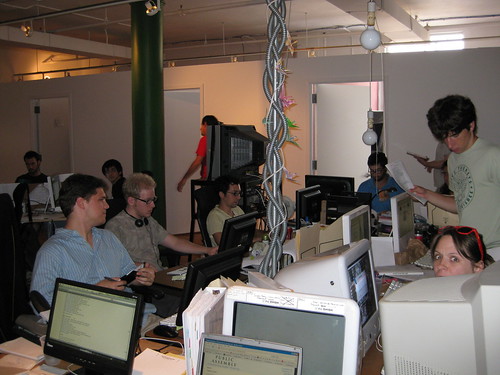Waiting anxiously for my friend Lianna* to come over the other evening, I decided to put on the water for varenniki dumplings. She and several friends showed up a few minutes later, and we sat down at the kitchen table to chop vegetables from the market: large grime-covered carrots the size of my foot, plump potatoes left over from last week’s cooking, tomatoes and cucumbers for a salad, onions for a stew. As we each pulled out a knife or slicer and set to paring and peeling, I asked a little more about them. I learned that they all work at various government embassies and nonprofits around town, as unpaid interns.
Lotte* tells me that she’s from the EU, but has relatives living in Russia, near Petersburg, some uncle with a property in the country. She’s large and tanned with soft brunette curls, a flowered scarf around her neck, and pale jeans. She often turns to her friend Sanne*, a petite German girl, to ask about this or that usage of English. Sanne’s short and sharp-tongued, hair in a braided bun, wears a pullover and jeans.
*Juliette’s from France, and all of these girls speak in gaps and flows of language: Dutch, French, Russian, English. She’s the best-dressed of them all, with long blond hair almost reaching the short skirt that neatly meets her ample-curves – and stops, just at the point you think would be too far, but it isn’t quite. She frequently adjusts and pulls on her draped black overlayers, speaks rapidly in French, and pops another chocolate in her mouth.
The fourth is Paola, slim girl from Italy who wraps her dark-jeaned legs in a twine, half of her hair pulled up in a clip and the other half hanging curly and loose. Paola tells me as we chop vegetables that she won a competition in Italy to do an unpaid internship with the Italian embassy, and so she’s working six months or so for free.
These girls are educated and speak in four or five languages, and trade jokes about time they’ve spent in Moscow – the babushkas are waiting when you come out of the subway, they say, and the first one holds up a pair of tights in one hand, and a green shirt in the other. And that’s all she’s selling. And further down, Lianna adds, laughing, there’s someone with 12 packets of tights.
Where do they get the tights from? Juliette wonders – do they steal them?
No, maybe they buy them somewhere, Lotte grins, adding that another unfortunate victim of the Soviet collapse is surely standing there with a three cucumbers, a book, and a pair of socks.
Of course the conversation circles and circles back to the magnificent and diminutive Herr Janssen, who runs the office where several of the girls work. He boasts half a dozen degrees, most of them honorary, and claims to speak ten languages. He’s bored and leaving soon for another post, but is quite well-paid, a member of the European bureaucratic elite. “He’s told us,” Lotte says, “that when we start out in the foreign service we’ll get 4,000 Euro a month, but you can rise higher. He gets over 100,000 Euro a year, or maybe it’s 10,000 Euro a month…”
“And his house and car,” Sanne laughs, “and tax-free vacations to Thailand, and all his conferences, and his driver and his food.”
“What exactly does he use the money for?” Juliette wonders over her pot of soup, carefully sipping it. “He has a house in Luxembourg,” Lianna pipes up.
“What I’d do for even a few Euros…” Paola says quietly, crossing her legs and pouring a little more tea.

And this brings up the question of internships. These girls are all working for free, spending 40-50 hours a week preparing reports for various European governments. Yet in Herr Janssens’ compensation package, and the huge budgets for local events that no one wants to organize, they can clearly see the money flowing.
“Would it hurt so much to give us 200 Euros a month?” Lotte asks.
“Or at least room and board,” I argue, “even slaves and children get that.”
“But we’re gaining work experience,” Sanne says.
“But you’re going into debt!” I argue, knowing that Lianna has taken out a huge student loan from a top UK institution to finance this internship–from the same government that’s using her labor for free.
They shrug and seem to think their governments are justified in using them this way, even as they wish they weren’t losing money in the deal. They tell me the Christmas party budget was cut this year, so the embassies can’t pay for the interns to attend. But emails still circulate as the professional bureaucrats debate whether the food is better at the Rixos or the Radisson in Astana — either will be 90 Euros a plate.
A few days earlier, an email had gone out in a panic: “We have to use up the budget before the end of the year… please find something to use it on!”
The interns laughed about it, huddling together over computers and cheap tea in a small closet-room. As their elbows brushed the scanner and printer, they wondered why they weren’t “something” to use the excess budget on.
Are Internships Moral?
The NY times has just posted a recent debate about whether companies and non-profits should be allowed to offer unpaid internships. One young lawyer, David Lat, gives a list of spurious reasons that unpaid internships are good for young people, citing his anecdotal experience, and suggesting that for-profit employers have to show a profit and therefore have a right to hire vulnerable workers without pay (why not just obtain slaves?). He responds to two other critiques of unpaid internships this way:
The lawsuit against Hearst claims that unpaid internships exacerbate class divisions, because some people can afford to work free and others cannot. But the same could be said of almost any opportunity that allows students from wealthier backgrounds to enhance their human capital… The lawsuit asserts that unpaid internships indirectly contribute to higher unemployment. But minimum wage laws themselves, the laws that unpaid internships sometimes violate, arguably have the same effect.
David Lat then recommends that government only sue employers in case of “egregious” violations – presumably using the services of a lawyer like him.
Internships and Class are a Freedom and Justice Issue
This is nonsense. Class is a serious issue. I was amazed when job-searching at the places that wanted full-time professional workers for free, bringing in several years of skilled experience.
I couldn’t consider the free ones, but I did look at low-paid internships. And that in itself was only possible because my parents paid most of my college tuition, leaving me with only modest student loans. Yet many of my classmates took on heavy debt loads, or have families that needed their financial support. They can’t afford to use their skills for free, in the hope that they might get on a road that might “go somewhere” someday.
There is a serious barrier between upper-middle-class families who can sponsor their children to live on prestigious unpaid internships for six months, the middle-class students like myself who can live on ramen and rotting teeth for six months, and the lower-income students who bring similar skills and potential, but lack the money to float them through years of low-pay in order to invest in a career. Judging from what I’ve seen, these talented college grads on the low end wind up at Kroger’s or temp agencies, unable to afford the increasingly costly and time-consuming path to an independent career.
I’ve worked my share of unpaid internships, but short-term and narrow in focus: compiling donor databases for a levy campaign, developing a communications plan for a miniscule nonprofit, crafting a blog for a wonderful creative-arts organization (yay SCRAP-DC!), or writing grant proposals for nonprofits in Kazakhstan.
In each case, these internships were targeted and mutual on all sides. Through the internships, I developed key skills and helped out a low-income nonprofit, but I was still fundamentally independent and able to walk away at any time. And, I was pursuing larger projects or education at the same time, rather than sitting at a computer for hour upon interminable hour, doing menial jobs, and hoping for my future career to start someday.

In fact the U.S. Department of Labor has a six-point test for unpaid internships, which should be strongly educational and mostly benefit the intern. Interns shouldn’t be taking the place of an entry-level employee or producing substantial benefit. As NPR reports:
[Ross] Eisenbrey thinks unpaid internships cut costs beyond hiring expenses. He says companies have saved big-time by turning the entry-level jobs of yesterday into the unpaid internships of today.
“The middle class is being undermined and the way it’s being undermined is by having salaries, wages and benefits undermined,” Eisenbrey says. “Nothing does that more directly than allowing employers to employ people without paying them.”
This is crucial. Lianna is treated exactly like an entry-level employee. She paid her own visa, but works free overtime, shows up when sick, takes all the notes at meetings, writes and researches political reports for inter-agency distribution, and proofreads everything written in her language. She is only given two vacation days a month from her unpaid internship, so she chose to home for the holidays, when the office will be closed anyways.
“Why are you taking so much time off at once?” Herr Janssens asked her.
Lianna explained that she hasn’t had a day off in four months, and her vacation will cause minimal impact over the New Year’s holidays.
Herr Janssens frowns. “Oh, yes… some people are sneaky like that. Well, enjoy.”
…As she wraps up the internship with Herr Janssens, Lianna commits to another full-time unpaid internship. At least the new nonprofit is flexible, letting her choose hours and level of involvement. I urged her to work for free only 3 days a week, and use the other days to study, learn, and meet people. But Lianna feels obliged to indenture herself full-time, or else it wouldn’t be a “real” learning experience. (Aaargh!)

Reflecting on our collective experience, then, these are my Tips for Evaluating Unpaid or Yuckily-Paid Internships:
1. An unpaid internship is worth it to gain experience and see if you really like the field. It’s worth it if you will gain direct access to useful contacts, or base-level skills. A part-time internship is worth it to fill a gap on your resume, and if you have a few free hours a week while in school, it certainly doesn’t hurt.
1. Expect to work hard during the agreed hours–but look for organizations that offer flexibility. You’re working for free (or almost-free). Favor organizations that want you to work on a narrowly-defined ‘extra’ project, as your time will be targeted and you can produce results to take elsewhere.
3. Avoid doing a full-time entry-level job for free. If it’s unpaid, look for 15 hours a week at max, and no more than six months in length. This way you get training and help them over time, but in a way that doesn’t replace a full-time employee.
4. Unpaid internships aren’t supposed to benefit the company more than the individual–if so, something’s terribly wrong. As a non-profit, don’t hire if you’re not willing to give as much as you give. And anyone who’s flexible and focused when working for free should definitely be hired on later, if you can afford it.
There you go, kids! Any other comments or suggestions?

yeah…we certainly wish some of our kids did not have to be “wage-slaves” like you describe 😉
Excellent, well-written post!
Pingback: The Peak of the Pyramid | The Dumpling Cart
Pingback: How to know if you should go to library school – Paper Humans